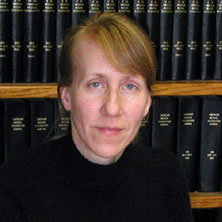|
|
For Release: March 28, 2005
Contact: DMS Communications (603) 650-1492
Advertising by Academic Medical Centers May Risk Eroding Public Trust, Says Study
WHITE RIVER JUNCTION, VT and HANOVER, NH - Most prominent academic medical centers develop and distribute advertisements to attract patients, but none have a formal review process to assess the balance and straightforwardness of these advertisements, according to a study by researchers at the Veterans Affairs Medical Center and Dartmouth Medical School (DMS). Several of the ads promote services of unclear health value to the public and, in some cases, seem to place the financial interests of the medical centers before the interests of the patients, the authors conclude.

Dr. Robin Larson
"We found it interesting that similar advertising practices by pharmaceutical companies have been criticized for creating demand for services and failing to present balanced information, but no one seemed to be turning the same critical eye on ads from academic medical centers," said Dr. Robin Larson, instructor in medicine at DMS and lead author of the study.
The study, published in the March 28 issue of the Archives of Internal Medicine, examined marketing practices of the 17 academic medical centers named to the 2002 US News & World Report's honor roll of "America's Best Hospitals." The researchers, all DMS faculty and members of the VA Outcomes Group in White River Junction, VT, interviewed each center's marketing department and obtained all non-research-related print advertisements distributed by the honor roll centers during 2002.
They found that while 16 of the 17 academic medical centers advertise to attract patients, none have a formal process for reviewing the ads to assure balance and straightforwardness. Of the 122 ads that were aimed at attracting patients, the most common marketing strategy involved an emotional appeal to evoke feelings of fear, hope, or anxiety about a health risk. The researchers also found that several of the advertisements promoted tests or services whose health benefits are unclear, such as full body CT scans, and all but one of the ads for specific services neglected to note the potential harms or side effects of the treatments they were promoting. Several of the ads were for cosmetic procedures.
"We were surprised by the apparent mismatch between academic medical centers' status as prominent and trusted sources of information and their use of emotional appeals and promotion of unproven services to generate revenue," said co-author Dr. Steven Woloshin, associate professor of medicine and of community and family medicine and a member of Center for the Evaluative Clinical Sciences at DMS.

The researchers noted that while the generally apparent financial interest of pharmaceutical companies may invoke a healthy degree of skepticism among viewers of their advertisements, academic medical centers may be viewed as more trustworthy sources of information. "We are concerned that when potential patients read these ads, they may not realize that the underlying motivation may be to attract patients, not necessarily to promote the health of the public," said Larson.
While the authors stress that they are not against advertising by academic medical centers and acknowledge public advertising may help to address financial challenges in what is becoming an increasingly competitive marketplace in healthcare, they recommend that the centers reexamine the process by which their advertisements are developed.
"We hope that academic medical centers will view our findings as an opportunity for improvement and a stimulus for developing guidelines for their advertising procedures," said Larson. "If they are going to advertise, we would like to see them promote evidence-based services or at least those likely to improve overall public health. Ideally, ads would be presented in ways that assisted the public in making good health decisions by providing balanced and objective information."
"Advertising by Medical Centers," the first study to examine advertising practices by academic medical centers, is co-authored Dr. Lisa Schwartz, associate professor of medicine and of community and family medicine, and Dr. Gilbert Welch, professor of medicine and of community and family medicine at DMS. It was funded in part by grants from the National Cancer Institute, the Robert Wood Johnson Foundation, and a Research Enhancement Award from the Department of Veterans Affairs. The research was conducted at the VA Hospital in Vermont where members of the VA Outcomes Group promote balanced information about risks and benefits of medical care and investigate the effects of expanding definitions of disease (more info at: http://www.vaoutcomes.org/about.php).
-DMS-